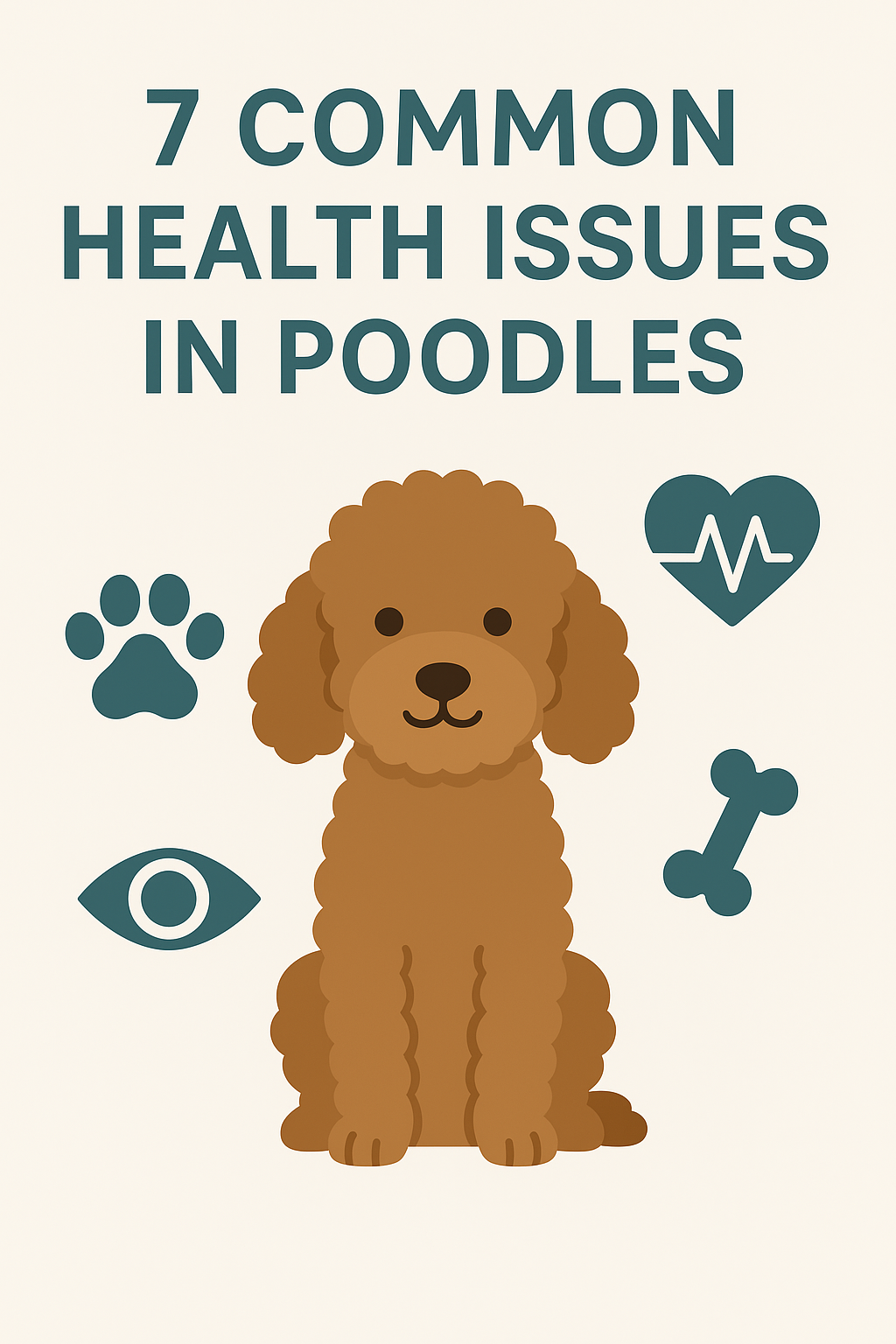
🐩 7 Common Health Issues in Poodles – How to Prevent and Manage Them
7 Common Health Issues in Poodles – How to Prevent and Manage Them
Why Do Poodles Need Special Health Attention?
Poodles are beloved for their intelligence, elegance, and affectionate personality.
They come in toy, miniature, and standard sizes, making them a versatile breed for various lifestyles.
However, due to their genetic predispositions and anatomical traits, they are more vulnerable to certain health conditions.
Understanding the 7 most common health issues in Poodles will help you protect your dog’s health and quality of life.
⚠️ 7 Common Health Issues in Poodles
1. Patellar Luxation
-
Especially common in toy and miniature Poodles
-
The kneecap dislocates, causing limping or skipping while walking
-
Prevention: Avoid jumping, use anti-slip flooring, maintain ideal weight
-
Treatment: Medication, physical therapy, or surgery in severe cases
2. Progressive Retinal Atrophy (PRA)
-
Genetic eye disease causing gradual vision loss leading to blindness
-
Early signs include night blindness or bumping into objects
-
Prevention: Genetic testing before breeding
-
Management: Prepare the home for a blind dog (stable furniture, safe layout)
3. Mitral Valve Disease (MVD)
-
A heart condition common in older miniature and standard Poodles
-
Symptoms include coughing, shortness of breath, and exercise intolerance
-
Prevention: Regular cardiac exams (auscultation, echocardiogram)
-
Management: Prescription medications and lifestyle adjustments
4. Ear Infections (Otitis Externa)
-
Poodles have hairy, floppy ears that trap moisture and bacteria
-
Symptoms: head shaking, odor, ear discharge
-
Prevention: Clean ears 1–2 times weekly, pluck excess hair
-
Treatment: Antibiotic or antifungal ear drops prescribed by a vet
5. Allergic Dermatitis
-
Poodles are prone to environmental or food allergies
-
Symptoms: itching, redness, licking paws, or hair loss
-
Prevention: Feed hypoallergenic diets, avoid known allergens
-
Management: Antihistamines, medicated shampoos, vet-guided treatment
6. Cushing’s Disease
-
Caused by excess cortisol production from the adrenal glands
-
Signs include: excessive hunger, thirst, urination, and pot-bellied appearance
-
Diagnosis: Hormone testing and ultrasound
-
Treatment: Long-term medication or surgery
7. Chronic Kidney Disease (CKD)
-
More common in senior Poodles
-
Early signs: increased drinking and urination, weight loss, bad breath
-
Prevention: Routine bloodwork and urinalysis
-
Management: Renal diet, fluid therapy, and prescribed medication
🛡️ Daily Care Tips to Keep Your Poodle Healthy
-
Schedule routine vet checkups every 6–12 months
-
Use non-slip flooring or steps to reduce joint stress
-
Feed breed-appropriate or prescription diets
-
Brush teeth and clean ears regularly
-
Maintain a healthy weight and daily walks
🛒 Recommended Products for Poodle Health
-
Orthopedic steps and joint support beds
-
Natural ear cleaners and grooming tools
-
Hypoallergenic food and coat-support supplements
-
Heart and kidney-support treats and powders
👉 Shop Poodle Health Products
External Resource (DoFollow)
More information: American Kennel Club – Poodle Breed & Health Info
Internal Resource
👉 Related article: Mitral Valve Disease in Dogs – Symptoms, Treatment, and Daily Care
🧩 Frequently Asked Questions (FAQ)
Q1. Are Poodles genetically prone to disease?
A1. Yes. Many common Poodle conditions like PRA, patellar luxation, and MVD
are genetically inherited, so early testing and regular exams are essential.
Q2. How often should I clean my Poodle’s ears?
A2. Due to their ear shape and hair growth, cleaning 1–2 times a week
with a gentle ear solution is highly recommended.
Q3. My Poodle seems itchy often — is it allergies?
A3. It’s very likely.
Poodles are sensitive to food, pollen, or environmental triggers.
A vet may recommend allergy testing and a tailored care plan.
⚠️ What to Do If You Suspect Your Poodle Has a Health Issue
Early recognition and swift action can make a huge difference in your Poodle’s long-term health.
If your Poodle shows any unusual signs or symptoms, follow these steps:
✅ 1. Observe and Document Symptoms
-
Watch for signs such as limping, persistent scratching, eye cloudiness, coughing, or changes in appetite or behavior
-
Take photos or short videos of visible symptoms
-
Write down the onset, frequency, and duration of any abnormal signs
✅ 2. Minimize Physical Stress
-
Avoid vigorous walks, jumping, or play until your dog is assessed
-
Keep your Poodle in a calm, quiet space with easy access to food, water, and a soft resting area
✅ 3. Avoid Home Remedies Without Vet Approval
-
Do not give human medications, essential oils, or unverified supplements
-
Many common items can be toxic or harmful to dogs, especially those with underlying conditions
✅ 4. Contact Your Veterinarian Promptly
-
Describe your observations clearly and mention any relevant breed risks (e.g., eye disease, joint issues)
-
Ask if the situation requires an emergency visit or can wait for a scheduled appointment
✅ 5. Prepare for the Vet Visit
-
Bring any medical history, list of symptoms, medications, and photos
-
If your dog is coughing, bring a video to help the vet evaluate the sound
-
Bring a fresh urine sample if the issue may relate to kidney or urinary problems
🐾 Bonus Tip: Don’t Wait for “Obvious” Symptoms
Many diseases common in Poodles, such as PRA (eye degeneration) or mitral valve disease,
progress silently for months before visible signs appear.
That’s why routine wellness exams and lab testing are essential, even if your Poodle seems healthy.


